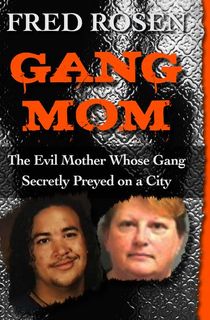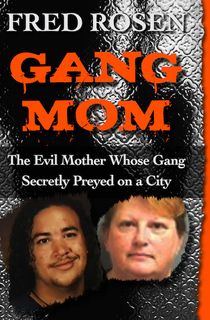Before she was the "Gang Mom"—the matriarchal figure of young, Oregon-based gangsters—Mary Thompson spent decades honing her skill as a liar.
Her life of deception in 1970s Cleveland, where she was a prized biker girl, having gained respect by falsely accusing a rival gang of rape. Fast forward one divorce, one child, and a decade later, and Thompson began toying with the drug-making business. Once again, she played dirty: After angering some of her business associates, she served as a police informat on the sly to "keep various people from killing each other." Or namely, from killing her.
But the pinnacle of Thompson's criminal career came in the 1990s, once she had settled in Eugene, Oregon. When her teenage son, Beau, got involved with gangs, Thompson became an anti-gang advocate, earning the name "Gang Mom" in the local media circuit. It was an ironic disguise, given that Thompson was a "gang mom" of sorts. Charismatic and outspoken, she had a troop of delinquent juveniles—including her son—wrapped around her finger. In fact, Thompson's personal gang would carry out her most heinous crime: the murder of 18-year old Aaron Iturra.
Aaron Iturra had recently seen Beau, his friend, draw knives on a group of teens, and planned to testify. This terrified Thompson. If Aaron were to tell the police what he'd seen, Beau would surely be sent back to jail. And Thompson, having fought so ruthlessly for her son's release, would not stand for that.
She knew she had to act, and fast. With the help of her “children”—Joe Brown, James “Jim” Elstead, Lisa Fentress, and Angel—she would her execute her plan: Mary "Gang Mom" Thompson would kill Aaron Iturra, and she would save her son.
Read an excerpt from Fred Rosen's Gang Mom to get an inside look at the night of Aaron Iturra's murder.
Joe Brown stood in front of the Iturra home. The house was a panhandle, situated in back of another, the two connected by a narrow alley. The beauty of it was, you couldn’t see the panhandle house from the street. This type of dwelling was common in Eugene.
Brown was a short kid who, at five-foot-six, weighed all of 140 pounds soaking wet. Dressed in black shirt and pants, with jet-black hair, scraggly mustache and goatee, he cased the joint. Quickly, he realized he had come too early. The house was lit up. People inside were still awake. He left and returned around midnight.
This time, the house was dark. He tapped the glass of the living-room window several times just to be sure. When no one answered, he walked back to the far end of the alley where Jim Elstad crouched in the darkness.
“Iturra’s asleep,” he whispered, the cool night air making his breath come out in a white plume.
Elstad nodded and followed Brown back to the house. Both boys were dressed in the gang colors: blue bandannas over their faces and heads, blue bandannas covering their hands. Their gang leader had told Elstad and Brown that the open display of their gang colors was a symbol that someone was going to get killed. This was ritualized behavior. Dressing in this manner signified this as a Crip event, a Crip killing. Their gang leader had assured them that their “brother” Crips in Portland and Los Angeles would soon know about their work.”
They lifted the door of the garage, and found themselves standing before a bedroom that had been partitioned off by sheet rock in the rear. Brown pushed at the door of the makeshift room.
Clothes, beer bottles, soda cans and empty pizza boxes were strewn all over the floor. On a small dresser made of cheap pressed wood were various types of shaving lotion and high school loose-leaf binders filled to bursting. There was also an old console color TV set.
Two of the walls were decorated with posters celebrating Motley Crue, Menace II Society and Budweiser beer. There were pictures of two attractive young women dressed in low-cut outfits revealing their cleavage. The two other walls of the bedroom were covered in graffiti.
And there on the bed was the target, Aaron Iturra, sleeping arm in arm with his girlfriend Carrie Barkley.
Brown shook Aaron’s bare back. The teenager continued to slumber, but then Brown saw Iturra move his head a little bit, and start to get up. By then, Jim Elstad was at the door, holding a .45 caliber Smith & Wesson revolver in his right hand. Steadying it with his left, Elstad raised the weapon.
Brown reached down to the girl’s purse, which sat on the floor amid the litter of the beer bottles and pizza cartons. He reached in and took out a pack of cigarettes, which he pocketed, then stood up and to the side.

A few houses away, Jack and Cameron were visiting Angel. They were hanging out like they always did, smoking cigarettes, Angel doing so despite the fact that she was pregnant. They were talking about scams when they heard a loud pop.
“F—!” Angel exclaimed.
“Was that it?” Jack asked.
“That was it!” Cameron confirmed.
A neat, red hole had materialized in the back of Aaron Iturra’s head. Iturra slumped back down, the mattress suddenly turning a dark red. Carrie came awake instantly and screamed, “Help me, somebody come and help me.” Elstad and Brown turned and ran. Soon, they were back on the street and Elstad turned to Brown.
“I can’t believe it. I shot that muthaf—er in the back of the head,” he said with a great big smile.
Not a minute later, the boys came running in “the door of the house that Jim shared with his sister Angel and their parents. Shaking violently, Jim Elstad declared, “I did it! I did it!”
Angel looked at her brother and smiled.
“Well, how do you feel?”
All of the Crips in the room looked at Jim, who beamed proudly, like the kid who had sunk the big basket with regulation time gone.
“I feel great! ’Cause you get such a thrill from it, you know?”
“Yeah, you get a real thrill from it,” Joe Brown repeated.
Joe opened his fist. There on his palm, for all to see, were four bullets and one spent shell.
“Oh, God,” said Angel.
They all looked at her. Water was seeping down her leg.
“My God, it’s coming!” she screamed.”
...Joe Brown stood at a secluded spot outside of Eugene on the banks of the Willamette River. Behind him was a station wagon, with its headlights on, illuminating the river. In front of him was raging white water, flashing in a quick torrent over rocks in the river bed. To his right, in the encroaching darkness, he just barely made out the dark forms of trees that lined the banks. To his left was a little island that had formed in the river where the water table had gotten too low. It was a perfect place for concealment. Dark, silent, alone.
Brown reached in his pocket and came out with the crumpled pack of cigarettes he had taken from the girl’s pocketbook. He shook one out and lit it, savoring the smoke going into his lungs, calming him down. Then quickly, he emptied the revolver of the remaining five bullets. Reeling back his arm, he threw them out as far as he could. He didn’t make the rapids.
The bullets sailed out into the water about fifty feet from the bank and fell into shallow water. Still, that was okay; the river bottom was brown. They’d just blend in. So would the gun, which he tossed in a moment later. It sank rapidly into the silt.
There. Over and done with like nothing had happened.
Joe Brown turned sharply and walked back to the car. He got in and closed the door. The wagon backed up and turned onto a ribbon of concrete that paralleled the river. They drove for a while, then turned down a side street, stopping to rest in front of Brown’s home. He got out, then leaned back in the open window and said to the driver, “See you tomorrow, Moms.”
The woman he had called “Moms” watched as he ran up the driveway and disappeared inside.

Lisa Fentress awakened from her marijuana-induced sleep to the sound of her phone ringing.
Who was that? she wondered.
She couldn’t be sure, and she didn’t care. She liked where she was, half asleep and half awake. Didn’t have to deal with anything. Didn’t have to see anyone. Didn’t have to have any responsibility for what she’d done. Maybe, if she tried, she could make the phone go away.
After a while, the phone stopped ringing and Lisa floated back into cannabis dreams.
At 5 a.m., Lisa awoke when her pager went off. She dialed the number on the digital display.
“Aaron was taken care of,” said the voice on the other end of the line.
Want to keep reading? Download Gang Mom, by Fred Rosen, today.
Featured photo of Mary Thompson courtesy of Open Road Media


